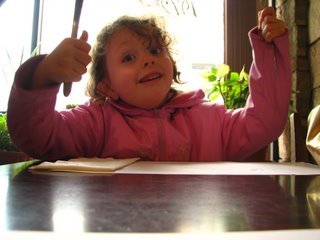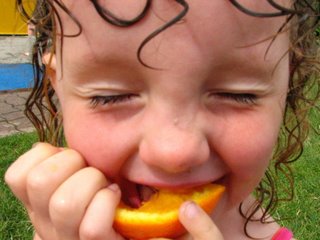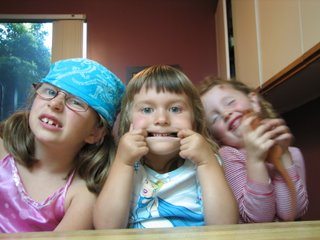Introducing the new date
I’ve had the good fortune to meet a woman and fall… well, you know. I’m pretty excited.
The question is, when to introduce Maia to the new… er, date? Partner? Lover? Well, perhaps a combination of all three. It’s a pretty frightening thing for me, because I’ve heard the horror stories from friends who mostly say that you want to keep the two lives separate for as long as possible to avoid complications and hurt feelings.
I’m pretty careful with my daughter and if you read this thingamablog ever, you know I care deeply about my kiddo. But let’s face it, if you’ve got a good line of communication going with the child, you talk about how you feel, how the kiddo feels, and share regularly, how the hell are you going to avoid telling them about the most exciting new thing in your life? For us grownups, forging a new relationship can be better than Christmas and Disneyland combined, so how are you going to hide that?
Ok, so I’ve known this person for a month, which is only long only by the yardstick of the life of certain insects, but I’m not all that concerned that this time. Maia has been introduced to one girlfriend in the past four years, and that time it was as a friend. This is different.
I’m guessing that if you introduce your kid to a new girl much more often than that, there’s a bit of a problem, and it’s going to lead to other problems down the road, including: fear of abandonment, lack of trust, self esteem issues or even, god forbid, resentment toward you, the parent who couldn’t create a sense of stability. If you're one who attracts drama, your child is not going to benefit from it, no matter how much of a rush it gives you.
The difficult question is how to introduce the new partner. I’d been thinking about it for a few days, when I picked my daughter up from daycare after work. Finally I just blurted out: “Maia, what would you say if I told you I had a girlfriend?”
She didn’t miss a beat, “Good.”
Phew.
“Well, what would you think about meeting her?” I asked.
“A new babysitter!” she said, though I still don’t know why.
“Well, no, I don’t think she’d be your babysitter. Not for a while anyways.”
It felt a little too easy, which always makes me worry. So I went on and without a script was a little lost.
“I think you’d really like her. She, uh, she’s a dance teacher.”
“Is she going to be my dance teacher?”
“Umm, no. No I don’t think that would be a good idea at this point. But she’d probably love to dance with you,” I reassured her.
Maia usurped my conversation and we moved on to other things, but now the seeds had been sown. I felt good about it.
The tough part about dating as a co-parent is keeping the schedule sane. I’ve got Maia half the week, so most adult socializing gets taken care of on the off days. And we visit friends with kids on the Maia days. Great. Now there was a person who I wanted to see on the occasional Maia day, too.
Now, Maia’s a pretty heavy sleeper, but I still somehow felt like a kid again (which is good) to be sneaking around her back while she was asleep. But I didn’t want to risk her stumbling onto a PG (or worse) rated scene with someone she’d never met. Nor someone she had met. No more than I want to walk in on my own parents. Woah. Cough. Nope.
One night last weekend, Maia had planned to have a friend over for a sleepover. The opportunity seemed ripe. I asked Maia if I could have Kelly over for a few hours, too. She agreed.
Before our guests arrived, I had a little talk with Maia.
“Hey, Maia. You know, Kelly’s my good friend, right?”
“Uh huh.”
“Can you please look at me?”
“Okay, Daddy.”
“She’s a really good friend of mine. So, I’m going to ask you to show her the same respect you would any of my friends, okay?”
And then she did one of those things that just make the whole parenting gig worth every headache and sleepless night. She held up her pinky finger and said, “Pinky swear.”
And in the end, the most stressed out person that night was me, and it seems, so far, knock on wood, that I had little to be stressed about.












